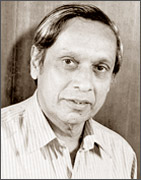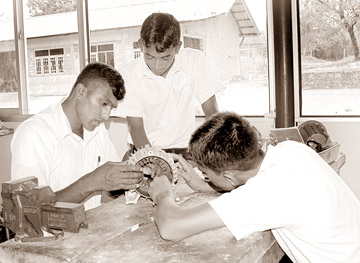Reform strategy in higher education - Part II
************
Text of speech delivered by Higher Education Minister Prof. Wiswa
Warnapala at the launching of the World Bank’s Sri Lanka Higher
Education Sector Report at the Hotel Galle Face on July 17, 2009.
************
|

Prof. Wiswa Warnapala |
It is on the basis of the improvement of the access that both quality
and relevance could be developed within the system. The access, through
the external degree program and enrollment in tertiary institutions, has
expanded in the last several years. The expansion needs to be
accompanied with inclusiveness, and it essentially means an increase in
enrollment.
The haphazard expansion, the adoption of ad hoc policies to tackle
issues of access, and the over-emphasis on traditional disciplines, the
continued reliance on the Arts system, resistance to curriculum reform,
have affected the economic relevance and quality improvement in the
higher educational sector.
Overturned concept
All these ills, including those factors associated with violence and
closures of the Universities have created a situation where the graduate
find it difficult to find a job in the private sector as they do not fit
into the jobs in this sector.
Therefore, the burden is on the State and the perception of the
graduate, articulated by certain political parties, is that it is the
duty of the State to provide them with employment; the perception in
this country is that a person goes to the University, not to acquire
knowledge but to get a job, and the whole concept of the University has
been overturned.
The State, by compulsion, is expected to provide them with jobs. It
is only through a rational diversification of the system, and also with
an expansion of the non-tertiary sector that we can bring an end to such
attitudes and perceptions.
As long as the entire system remains totally State-funded, such
perceptions cannot be eliminated; in my view, a construction of a highly
competitive system of higher educational institutions, embracing both
the public and the private sector, would bring about a change in
relation to these issues, which are part of the political culture
developed as a result of the partial impact of the social demand model
of education, and once competitiveness enters the system, on the basis
of global considerations, the system is certain to produce both economic
relevance and quality.
Global excellence
|

Vocational skills vital to enter the job market. Picture by
Ranjith Jayaweera |
Since the development of a knowledge economy remains an important
goal of all the developing countries, the establishment of educational
institutions of global excellence should be the priority of the
countries in our region.
Our experience in higher education, the role and capacity of our
higher educational institutions, including those in the non-tertiary
sector, is more than sufficient to build a base for the emergence of
global centres of excellence.
The World Bank sponsored programs in the Universities has laid a
solid foundation for this kind of change, and quality improvement, in
the form of a panacea, has captured the minds of academics, whose role,
as both teachers and researchers, have visibly declined in the last two
or three decades due primarily to the absence of a vibrant intellectual
culture in the Universities.
When I speak of a global university, as a centre of global
excellence, I envisage, in my own way, a new curriculum and a research
culture based on an awareness of the political, economic, social and
cultural phenomena, without which issues of global significance could
not be understood.
It is my view that all our Universities, both old and new, have
specific and varied problems, and they need to be addressed from the
point of view of a common perspective on Higher Education. In the
improvement of both quality and relevance, it is the need for a common
policy strategy-which needs to be given immediate recognition.
In the formulation of policies and strategies, based on current
global considerations, one does not need to forget and discard the
useful traditions of the system in the past, and they, depending on
their relevance and utility, need to be made use of as a resource for
further development and change.
If a global agenda is to be adopted on the basis of the reforms
through which we intend to improve both quality and relevance, new
policies are necessary to develop scholarship as one of its main
missions. While we are improving quality, are we taking steps to improve
both scholarship and research.
Importance of research
No University can function, in the modern context, without an
internationally recognized research profile, and it is this status which
can inculcate a desire for learning in the undergraduate community.
As Eric Ashby said “We talk about the University as a community
dedicated to the preservation, advancement and transmission to
knowledge”. It is in this context that we need to stress the importance
of research in the Universities; today Sri Lanka is going through a
period of transformation, and the Universities, if interested, can make
use of this process of change for both useful and relevant research with
which public policy on many a matter could be produced.
In our reforms strategy, the promotion of research will be given
priority. It is in relation to it that we propose to expand the programs
of the Post-Graduate Institutes in the Universities sector; they are
catering to a large number of post-graduate students who are primarily
in Masters level courses.
They enter such courses to enhance their employment prospects; what
the country needs is an intellectual community capable of undertaking
research on the basis of relevance so that the output of research could
be used for the formulation of public policy. In other words, I am
advocating policy-oriented research as the country is undergoing a
period of transformation, for which new policy initiatives are
necessary.
Indirect role
It is only through such research that the role of higher education in
economic development could be realized. The World Bank has now
recognized the indirect role that higher education can play in
development and poverty reduction. Three key arguments have been
presented by the World Bank in respect of this matter.
1. Higher Education can contribute to economic growth by supplying
the human resources for a knowledge economy, by generating knowledge and
by promoting access to knowledge.
2. The view is that higher education has the potential to increase
access to education and in turn increase the employability of those who
have the skills for a knowledge-driven economy.
3. The argument is that higher education can play a role in
supporting basic and secondary education by supplying those sectors with
trained personnel and contributing to the development of curriculum.
It would be useful to make use of these policy-standpoints when
proposing changes in the field of higher education in Sri Lanka. All
policy-makers and reformers must realize the role of higher education in
national development, and it has an integral global aspect. It is
supporting an economy that is knowledge-intensive. This means that the
country needs to take bold initiatives in respect of certain aspects of
higher education policy.
To be continued
|



